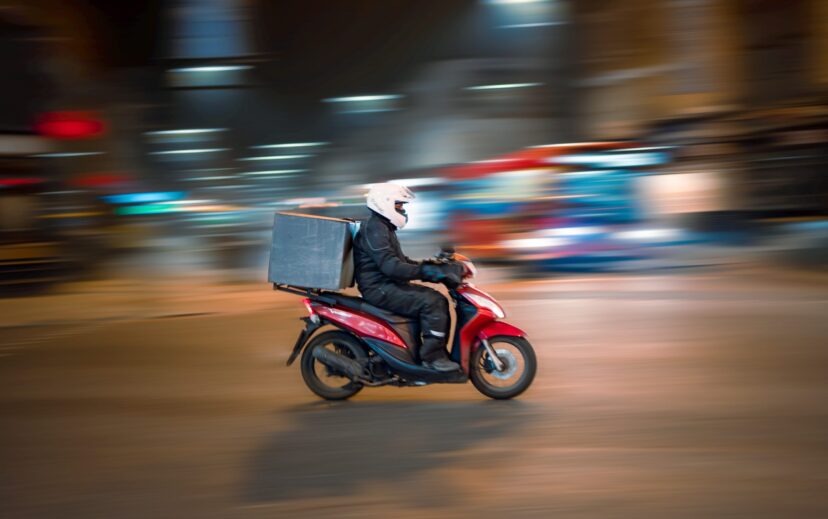Delivery drivers and bikers have been a modern fixture of New York for at least the last several years. Particularly after demand for food delivery spiked during the COVID-19 lockdown and has remained high, food delivery workers are an ever-present institution of the city, zipping around the streets on electric bikes with insulated bags, frequently carrying several deliveries at once. With the help of these workers, food delivery service apps like Grubhub, Doordash, Seamless, and Uber Eats have become extremely successful as the city’s primary food delivery service.
Previous Practices of Food Delivery Services
Despite this prevalence and the success of these companies, delivery workers have reportedly faced exploitative working conditions. Workers reportedly make less than the city’s $15 minimum wage and in some instances are even charged fees for the services that pay them. For each new trip the service sends the worker, they cannot see where their next pickup or destination will be, what they will be paid for that trip, or whether the customer will tip them until they accept the trip. In other instances, those tips can be subject to delivery service fees or even partial withholding of the tips themselves. Workers have even been denied the ability to use the restroom at pick-up restaurants, even as they enter the restaurant to collect deliveries.
This has continued in large part because food delivery workers are not employees of their respective food delivery services. Instead, these workers are hired on and treated as independent contractors. While independent contractors do have some workplace protections, they are not as strong as New York’s wage and hour protections for employees, nor can they qualify for federal unpaid family leave.
New York City Council’s New Legislation
In response to these reports and a coordinated lobbying effort from organized delivery drivers, New York’s City Council passed a package of legislation on September 23, 2021. These new laws are being reported as the strongest protections any city in the nation has yet passed to protect delivery workers.
This battery of five bills overhauls the relationship between food delivery service, delivery worker, and restaurant. As a result, a newly created section of the NYC administrative code creates a host of new rights for delivery workers and empowers private individuals and the NYC Department of Consumer and Worker Protection to enforce violations by food service providers.
What Obligations do Delivery Services and Restaurants Have to Food Delivery Workers?
As with any new law, the key for food delivery apps, workers, and restaurants that use delivery services is to understand exactly what is changing, what rights have been created, and when they go into effect.
Cited statutory provisions are accurate as of September 28, 2021, but are subject to change as they are enacted.
Toilet Access for Delivery Workers
The first right created by the new legislation is the right for delivery workers and drivers to use the restrooms of their delivery pickup restaurants. The text of the bill requires the contracts between food service providers and restaurants to grant delivery drivers bathroom access. The delivery worker must ‘lawfully be on premises’ for a customer’s delivery pickup for these provisions to apply. There are exceptions blocking bathroom access if it would require the driver “to walk through such establishment’s kitchen, food preparation or storage area or utensil washing are to access such [toilet] facility,” or if toilet facility access would create health or safety risks.
Insulated Delivery Bags
The proposed 20-1524 is straightforward. The section requires food delivery services to either provide their workers insulated food delivery bags at their own expense, or otherwise make them available to their workers without cost. Section 20-1524 further prohibits food delivery services from requiring workers to purchase their own insulated delivery bags. The section makes clear, however, that delivery workers are not required to use insulated bags in their deliveries.
Delivery Distance and Payment Transparency
Section 20-1521 has two major components. The first is delivery parameter control. The section allows delivery workers to create preference parameters for their trips. Under this section workers can set a maximum travel distance per delivery trip from a location they choose and refuse any trip that exceeds that distance. Workers will also be able to select certain bridges or tunnels they would prefer not to take and refuse any trip that would require crossing that bridge / tunnel.
The section also explicitly prohibits delivery services from offering delivery trips inconsistent with worker parameters or from penalizing workers for selecting or changing their parameters, and allows workers to change their preferences at any time.
Proposed section 20-1521’s second major component is a trip and payment transparency requirement. When sending a worker a new delivery, this section requires the service to disclose the proposed trip’s pickup location, estimated time and distance to the drop-off point, any customer gratuity, and how much money that delivery will pay (not including any customer tip).
Minimum Trip Payments
Proposed section 20-1522 sets out a minimum per-trip payment to delivery workers, but it does not do so immediately. Instead, the provision orders the City’s Department of Consumer and Worker Protection to study worker conditions and propose a formula for determining minimum per-trip pay by no later than January 1, 2023. The Department is obligated to consider a number of factors in reaching this minimum payment formula including: the duration and distance of trips; expenses of operation for various methods of worker transportation; types of trips; number of deliveries made during a trip; and workers on-call or work hours, in addition to any other relevant consideration. It will likely take the Department at least a few months to determine what an appropriate per-trip minimum formula is and pass the related minimum per-trip payment rule.
Critically, this bill also specifies that this minimum payment formula cannot include gratuity. This provision, in addition to the right under 20-1521 discussed above, is integral to the new legislative scheme to protect delivery workers’ rights to their tips.
Payment Service Fees Prohibited
Proposed section 20-1523 performs two roles. The first prohibits food delivery service providers from charging fees to their workers for receiving payment in certain ways or through certain services. The second requires delivery service providers to pay their workers on a regular basis no less frequently than once a week. Take note, however, that this provision will not take effect until 180 days after it is signed into law.
Enforcement and Remedies
Proposed sections 20-1501 through 20-1512 are arguably the most important sections of the legislation. Where the other sections create new rights, 20-1501 through 20-1512 create the enforcement mechanisms and private rights of action that the Department of Consumer and Worker Protection or individually harmed workers can use to investigate or report a violation, or seek compensation.
The bill charges the Commissioner of the Department of Consumer and Worker Protection with enforcing these new rights in a number of different ways. Section 1506 obligates food delivery services to keep records of their compliance with these new rights for the department to examine after ‘appropriate notice.’ If a delivery service fails to provide these records when asked, the service’s failure will be considered an admission that the allegation is true. This means that if a delivery service is being investigated for an alleged violation and cannot or will not provide relevant records, the department will presume that the related allegations are true. This presumption can be rebutted, but makes department investigations of delivery service violations very powerful.
The department is also charged with conducting outreach to delivery workers and food delivery services regarding these new rules, and must also make available notices of these newly created rights online in multiple languages.
Most importantly, section 1507 permits the department to enforce these new rights against food delivery services on their own initiative or by worker complaint. Violation of each new right comes with its own remedy. A violation of the trip disclosure transparency, punishing a trip rejection based on the worker’s preferences, a violation of the fee on payment service prohibition, and a violation of the insulated delivery bag rules each warrant a $200 penalty per offense. A violation of the minimum payments per ride (once set up) will result in compensation of three times the compensation of the trip that was not timely made. Finally, if a food delivery service retaliates against a worker – that is, if a service makes threats, intimidates or harasses a worker, disciplines a worker or reduces hours, pay, or their app rating – for exercising any of those rights, the penalty is $500 for each incident not involving denial of future work opportunities, and $2500 for violations involving denial of future work opportunities.
Finally, section 20-1511 provides that for any violation discussed above, injured parties can sue privately for compensation and recover their attorneys’ fees if successful.
Know Your Rights and Obligations
If you’re currently a delivery worker suffering mistreatment it will be important moving forward to know exactly what your rights are and what you can hold your service provider accountable for.
These new laws provide more protection for delivery workers than before, but because workers are still independent contractors, they are not as strong as protections for the city’s hourly workforce. For example, delivery workers could not bring a wage and hour claim against delivery services for unpaid overtime. However, if you are a worker and you believe you have been misclassified, or are an hourly employee and you believe your employer is withholding your overtime pay or not paying you enough, you may also have a viable wage and hour claim.
If you’re a service provider trying to stay compliant with the new laws, it will be important to develop internal practices consistent with the new recordkeeping and notice requirements to avoid violations and potential liability.
These new laws largely take effect 180 days after becoming signed into law by the mayor, which means investigations, complaints and suits will start being filed no earlier than late March.
Whether you are a delivery worker experiencing mistreatment, or a delivery service trying to ensure compliance with the new laws, an experienced attorney can help you determine whether you have a claim or help your business assess potential liability.
Photo by Rowan Freeman on Unsplash





